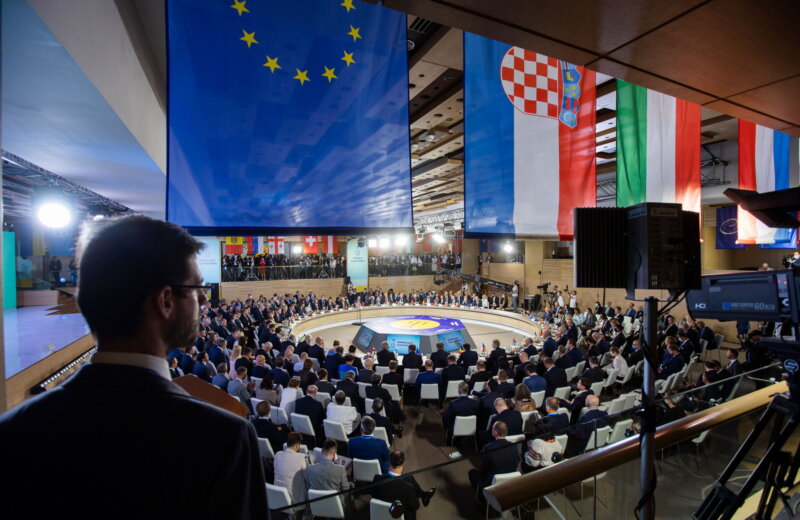Leaders and representatives of 46 foreign nations and international organizations gathered in Kyiv on Aug. 23 for the first summit of the Crimea Platform.
The Crimea Platform is Ukraine’s diplomatic initiative aimed at bringing global attention back to the issue of Russian-occupied Crimea and ultimately ending the occupation of Ukraine’s peninsula. It’s taking place on the eve of Ukraine’s 30th Independence Day.
In their joint declaration the summit’s participants reiterated that they don’t recognize Russia’s occupation of Crimea and committed to maintaining pressure on Russia to end the occupation of Ukraine’s peninsula by, among other means, imposing sanctions on Russia if needed.
They agreed to set up the International Crimea Platform “as a consultative and coordination format with the aim of peacefully ending the Russian Federation’s temporary occupation of Crimea and to restore control of Ukraine over this territory.”
Ukraine’s president Volodymyr Zelensky called this “a historical day” for Ukraine as the declaration officially recognizes Russia as an occupying power for the first time.
Thus, Zelensky said, Russia has to comply with international law — immediately allow in Crimea the watchdogs of human rights protection, the representatives of the United Nations and Organization for Security and Co-operation in Europe.
“The main achievement of the platform is that it took place,” he said, “despite all the resistance (of Russia) to it.”
The representatives of countries-attendees of the summit condemned the human rights violations at the peninsula without directly attributing them to Russia in their declaration.
The participants, however, were more explicit in their oral statements.
Austria’s Foreign Minister Alexander Schallenberg said that by occupying Crimea Russia was guided by the “law of the Jungle” ignoring the international rules.
The presidents of the Baltic states were among the most outspoken critics of Russia at the summit. They reflected on the Soviet occupation of their land and strongly supported Ukraine in its attempt to find a diplomatic way of ending Russia’s occupation of Crimea.
The leader of Latvia called Russia’s aggression impudent and brutal.
“This was a brutal violation of international laws and this issue has remained on the table since then,” said President of Latvia Egils Levits.
“Violation of international laws by occupying the land of another country is a policy of the 19th century, not that of 21th. And this policy should not be accepted by other countries,” he added.
The President of Lithuania agreed with a colleague.
“Lithuania will never recognize the occupation of Crimea. Every Lithuanian understands that Crimea is an inseparable part of Ukraine,” said the president of Lithuania Gitanas Nausėda.
“It is important that we are ready to resolve the injustice of the Crimea occupation,” he added.
The President of Poland Andrzej Duda said he and his nation feel the pain of Ukrainians caused by the Russian violent seizure of Crimea.
“Pols understand your situation, your feelings, your suffering,” he said.
“We know how it hurts when your allies are indifferent. We felt it ourselves in 1945 when our allies negotiated with Stalin and left us behind the iron curtain of his influence,” Duda said referring to the tragic events of the World War Second, when Soviet Union and Nazi Germany agreed to divide the world between the two and Poland appeared under the Soviet Union occupation.
Among the highest-ranking foreign leaders who attended the summit was the president of the European Council Charles Michele, the presidents of Latvia, Lithuania, Estonia, Poland, Hungary, and Moldova.
Ukraine’s key Western partners, the U.S. and Germany, were represented by energy ministers. Chancellor of Germany Angela Merkel skipped the meeting and the independence celebration, and instead visited Kyiv on Aug. 22.
Another key partner, and member of the Normandy Format talks, France, was represented by Franck Riester, a minister delegate for foreign trade. The country’s foreign minister was scheduled to join the summit, but was replaced with a lower-rank minister delegate.
Germany did the same, replacing the foreign minister with the energy minister two days before the event. Merkel said it was due to the crisis in Afghanistan, which needed the foreign minister’s attention.
Russia did not participate but actively criticized the event.
Russian ambassador to Germany, Sergey Nechaev, for instance, called Crimea Platform “a provocation event” aimed at “encroachment on the territorial integrity of Russia” in a statement.
Zelensky called on Russia to join the platform to find ways to end its occupation of Crimea and “fix the mistake that Russia made.”
“The declaration will always have a place for Russia’s signature,” he said. All of the attendees of the summit put their signatures under the document. According to Zelensky, it will remain open for every country or international organization to join.
“We begin the countdown to freeing Crimea,” he added.


















